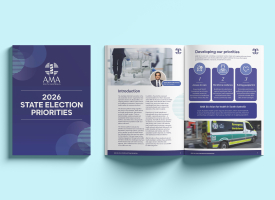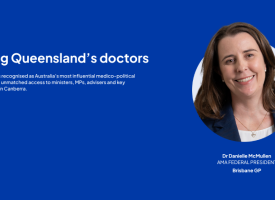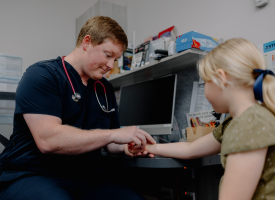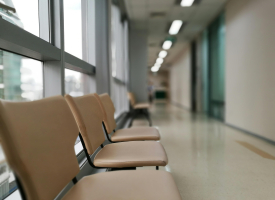Profiling DiT of the Month, Jasmine Davis
We’re continuing to highlight our wonderful Doctors in Training, Past-President of the AMSA Jasmine Davis.
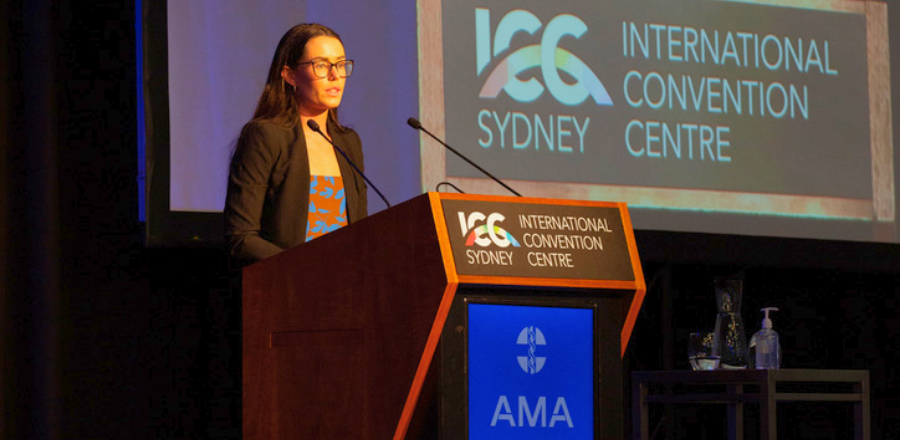
Name: Jasmine Davis
Pronouns: she/her
State/Country: Queensland (just moved from completing medical school in Victoria!)
Role in AMACDT: Past-President of the Australian Medical Students’ Association
Specialty: Intern Doctor (aspiring rural generalist)
What drew you to medicine?
I was drawn to medicine because I have always had a passion for health equity and thought that being a doctor would open many doors for me to be able to help reduce inequities. I’ll be honest that this passion has at times been squashed as I have learned how the systems (mainly hospital based) we work within today fail to serve our underprivileged, First Nations, culturally and linguistically diverse, women and LGBTQIA+ people, and are not built to manage chronic disease. However, I am continuously drawn back to medicine even as I’ve swayed slightly away from it to do other studies, because the impact that you can make as a doctor, whether you work in the hospital system, in primary care, or in broader healthcare system reform; is unparalleled, and I have been lucky to have seen doctors use this impact in such a way, and hope to do the same in my career.
Who is your greatest hero or inspiration?
While I could speak for hours on how Beyoncé is my hero, there’s no way I can’t say my parents. They have dedicated so much of their lives to their community and have done everything in their power to support my siblings and me, despite so many of their own challenges. They worked incredibly hard throughout my whole life, and it is so nice now as an adult getting to see them do all the things that they had to sacrifice when we were growing up. They inspire me every day to work hard, give back, and be kind.
How do you like to reset/destress (or rephrase to look after wellbeing?)
One of the only good things that came out of 2 years of Victorian COVID lockdowns for me was regaining my love of reading. I loved reading as a child and completely lost the passion in late high school/university. Now, my best way to reset and destress is sitting on the floor with a cup of tea and a book and transporting myself to the time and place of someone else’s words.
Where do you see yourself in 5 years?
I always answer this question with thinking whether what I am doing now is what I would have answered to this question 5 years ago, and the answer is of course it’s not. So truly, in 5 years I have no idea where I will be or what I will be doing. I hope that I have gained experience working in rural and hopefully more remote settings in northern Australia, and I hope that I am still passionate about advocacy and health equity. I am interested in pursuing the ACRRM training pathway and likely am interested in an advanced skills in mental health, but I’m in no rush to get there, and I am keen to see lots of Australia and the world along the way!
What is your top advocacy priority and why?
Marrying my love of rural health and health workforce advocacy, I would have to say it is the need to increase the number of medical students and junior doctors choosing a career in General Practice (or Rural Generalism), and overall support for GPs and GP registrars. Since entering medical school, I have always wanted to be a rural GP, and it continues to concern me that our healthcare system undervalues the work of GPs and that chronic underfunding of general practice has led to a declining number of people wanting to enter the specialty. We know that GPs keep patients out of hospital, and prevent disease, yet there has been a failure to adequately support and renumerate them. It has been wonderful to see some changes in the funding space, and I hope that this will continue and lead to more DiTs like you all, choosing a career as a GP.
What do you think is the biggest challenge for DiTs at present?
Having just joined the DiT space, it’s hard for me to truly say what the biggest challenge is, but from my time working in medical student and rural health advocacy, I think the thing we have all been impacted by at some point is the impact that this career has on our mental health.
What advice would you give to DiTs who would like to be more involved in advocacy?
I think the best advice I was given in my advocacy journey so far was “almost no doctor is actually trained in how to do advocacy – we have all learned it through necessity”. Doctors do advocacy because we have to, because the system is not able to adapt as quickly to our patients, or our needs, as it should. If you see a problem, don’t wait for someone who has the training or skills in advocacy to do something about it, because you may be waiting for someone that will never come. Your voice is important, speak up if something is impacting you, gain the support of your colleagues, and remember it is ok to learn advocacy skills on the go.
